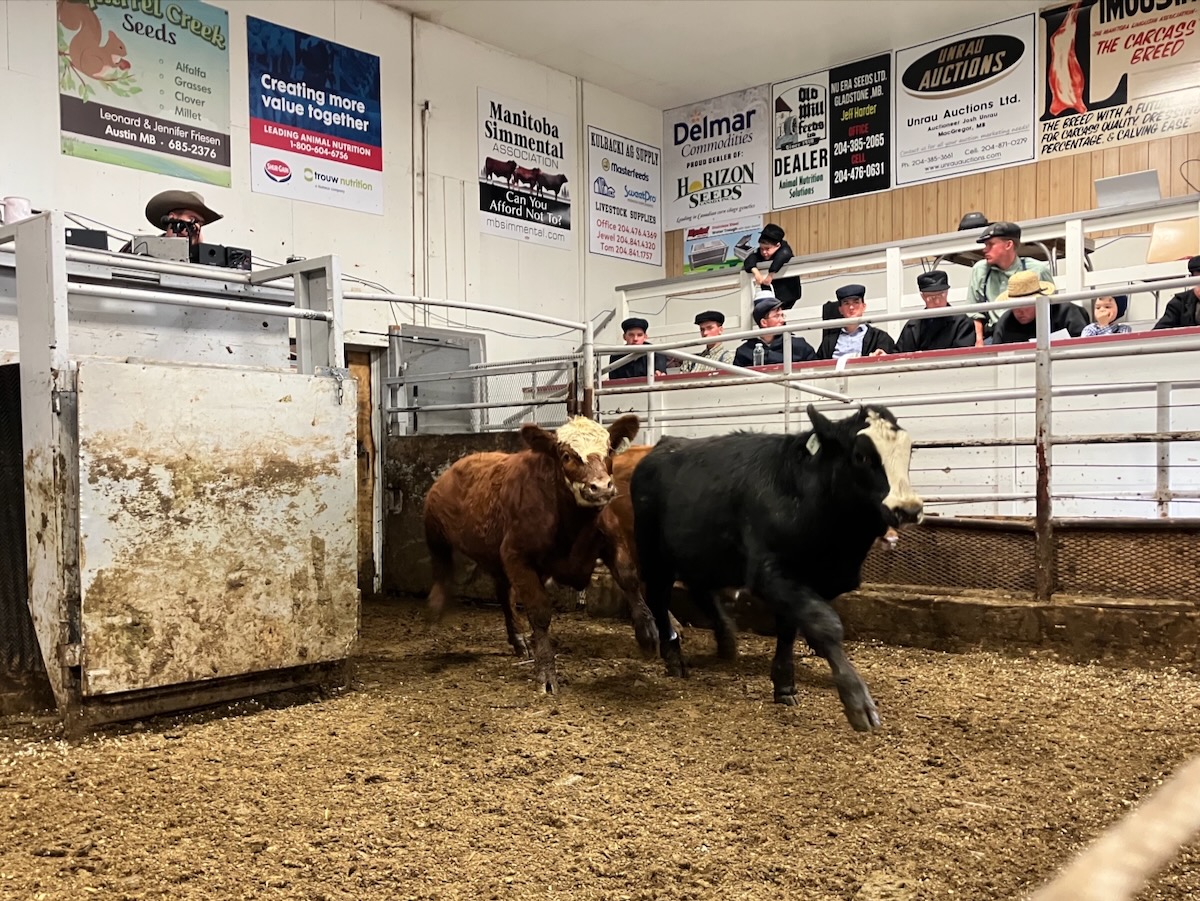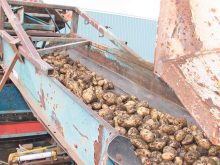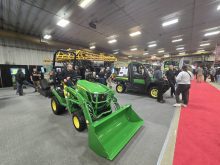Workers at Brandon’s Maple Leaf Foods plant say the company isn’t doing enough to keep them safe, and that they’re scared to come to work.
“We workers are crying for help,” they wrote in an open letter circulated by Migrante Manitoba, an advocacy organization for migrant workers in late August.
“It’s clear to us that the COVID cases (at the plant) are related to the facility’s inability to ensure safe working conditions or take workers seriously,” they wrote.
The group that wrote the letter also spearheaded an internal petition addressed to the company, which gathered around 200 supporters, according to Diwa Marcelino, an organizer with Migrante Manitoba.
Read Also

Manitoba cattle prices, Feb. 11
Your overview of cattle prices from Manitoba’s livestock auction markets for the period of Feb. 2-10, 2026.
Why it matters: An extended shutdown at pork giant Maple Leaf Foods in Brandon would be disastrous for hog producers, but workers and the union say it’s remaining open at the expense of immigrant workers.
As of Aug. 24, 74 workers at the hog-processing facility had tested positive for COVID-19 and 62 cases were active, according to the union representing the plant workers, UFCW Local 832. Those numbers were higher than the cases the province reported at the plant that same day — 52 cases with 34 active.
The facility, which employs upward of 2,000 workers and processes up to 15,000 hogs per day, remained open as of Aug. 27 and maintained it had no plans to close.
The province has repeatedly said there is no evidence of workplace transmission of the novel coronavirus at the hog-processing facility.
In an Aug. 24 press conference, chief provincial public health officer Dr. Brent Roussin said the cluster of cases in Brandon didn’t originate in the plant and said the sick people just “happen to work” there.
Roussin said the province is watching the facility carefully, but added that if evidence of workplace transmission comes to light, the first step needn’t be closing the facility. Further personal protective equipment or cohorting could be implemented, he said.
“Public Health and officials have said repeatedly that they have found no evidence of workplace transmission and the cases that have occurred among our team members appear to be linked to events and interactions within the community,” said Janet Riley, vice-president of communications and public affairs for Maple Leaf Foods in an emailed statement.
The company has repeatedly cited community transmission for the rise in the plant’s COVID-19 cases. Brandon had reached 126 active cases city-wide as of Aug. 27.
Last month the company and City of Brandon announced they would be distributing disposable masks for free in an effort to curb community transfer, plus about 10,000 masks earmarked for local social service agencies. The company later reported it had distributed 358,000 masks during its distribution day Aug. 19.
However, the workers who wrote the letter said the company is shuffling blame on to them and discriminating against migrant and immigrant workers, with the implication that their cultures present higher risks of transmitting the virus — that they live together, car pool or socialize outside work.
The writers say many workers have limited community interaction outside work.
Marcelino said none of the workers he’s spoken to in the past two months live with other workers who are not their spouse.
Two workers, who spoke to the Manitoba Co-operator under condition of anonymity, said they live in single-family homes and don’t car pool to work. One said she will wear a mask and socially distance when spending time with her sister.
Union president Jeff Traeger said while some workers are immigrants, most are well settled and own their own homes. No workers at the plant work there under the temporary foreign worker program, he added.
Workers looking for more
Workers told the Co-operator they are scared to come to work and don’t think Maple Leaf Foods is doing enough to protect workers.
One packaging worker said there are no sinks for handwashing or sanitizer in the cafeteria. Speaking through a translator, the worker said he will wash his hands in the bathroom before going for lunch, but he has to touch things in the cafeteria and would like to sanitize his hands before he eats.
The worker, who has been at the facility for seven years, said the area where workers swipe in and out gets very crowded and there are no markers on the floor to remind people to stay apart. The staircase from production to the locker rooms also gets very crowded at times and there is nothing to remind people to stay apart, he said.
Bathrooms make social distancing difficult as everyone rushes to use them during 15-minute breaks, he added.
Another worker, also speaking on condition of anonymity and through a translator, said she and other production-line workers wear white smocks while on the line and all hang them up in the same area when they leave the floor.
The area is crowded, and the coats overlap each other, she said. She argued it is not safe to have all the coats piled on top of each other like that.
The worker, who has been at the plant for 12 years, said the locker rooms are crowded. While people are required to wear masks, they often take them off as they change or to take a drink of water and it’s difficult to socially distance, she said.
The open letter added that locker rooms were rearranged in April, which made them crowded, and bathrooms have no health measures in place.
Traeger said locker rooms were rearranged and the company organized workers into cohorts, but added this caused confusion. He also said distancing is difficult in bathrooms.
“The company’s response has been, ‘Well, they may not be six feet apart, but they’re all wearing masks; they’re all wearing gloves; some of them have face shields on,’” Traeger said.
He said the company has told him there is hand sanitizer or washing facilities in all parts of the plant.
Maple Leaf told the Co-operator it will continue to conduct daily health and temperature screenings and to require masks and other personal protective equipment, along with other safety measures.
“We take the concerns raised in the letter today seriously. Because we are always seeking ways to improve, we welcome any constructive suggestions to strengthen the safety measures already in place,” said Riley.
Pork production hit
About 300 hourly workers (UFCW doesn’t represent salaried workers) were in self-isolation on Aug. 24. Absenteeism has been high, and some workers are also on vacation, Traeger said.
As a result, Traeger said production has backed up.
Thousands of pigs are being rerouted to other federally inspected plants, according to Manitoba Pork Council general manager Andrew Dickson on Aug. 25, something that is costing producers extra in transport in a time when hog prices are already poor.
Earlier this year, plant closures in both Eastern Canada and the U.S. led to a backlog of market-ready hogs and raised the threat of culls as barn space rapidly ran out. The disruption also sent markets spiralling. The hog sector reported significant price hits, including a dramatic fall in the weanling market.
The company has been asking workers for overtime every day, and in mid-August, put out a call for about 700 volunteers to work a shift on Saturday, Aug. 22. When it didn’t get enough volunteers, the company used a provision in the bargaining agreement to force between 450 and 500 workers to work Saturday to kill between 7,000 and 8,000 hogs.
The company said the move was an animal welfare issue, Traeger said.
Manitoba Pork said it will make every effort to relocate hogs if the plant shuts down, but closing the facility would likely lead to a backlog with potentially disastrous financial effects for producers.
“It’s a serious problem,” said Ontario market analyst Kevin Grier.
Maple Leaf Foods has also suspended pork exports to China, Reuters reported on Aug. 19. Chinese government protocols require any plant reporting cases of COVID-19 to suspend exports temporarily.
In 2019, China imported about C$609 million in pork, making it Canada’s third-largest pork market, Reuters reported.
Calls for closure
Traeger said workers are “freaked, panicked, scared to bring the disease home,” and don’t want to spend any more time than necessary at work. The union and workers who wrote the letter called for the plant to be closed long enough for the disease to be brought under control, for the facility to be cleaned, and for workers to be tested for the novel coronavirus.
The workers also called for job security and wage protection while the plant is closed.
“I agree that animal welfare has to be taken into consideration, I just don’t think it should take precedent over human welfare,” Traeger said.
















